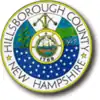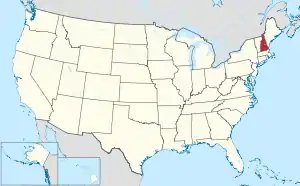Hillsborough County, New Hampshire
Hillsborough County is the most populous county in the U.S. state of New Hampshire. As of the 2020 census, the population was 422,937,[1] almost one-third the population of the entire state. Its county seats are Manchester and Nashua, the state's two biggest cities. Hillsborough is northern New England's most populous county as well as its most densely populated.
Hillsborough County | |
|---|---|
 Manchester skyline | |
 Seal | |
 Location within the U.S. state of New Hampshire | |
 New Hampshire's location within the U.S. | |
| Coordinates: 42°53′44″N 71°34′58″W | |
| Country | |
| State | |
| Founded | 1769 |
| Named for | The Earl of Hillsborough |
| Seat | Manchester and Nashua |
| Largest city | Manchester (by population) Weare (by area) |
| Area | |
| • Total | 892.5 sq mi (2,312 km2) |
| • Land | 876.5 sq mi (2,270 km2) |
| • Water | 15.9 sq mi (41 km2) 1.8% |
| Population (2020) | |
| • Total | 422,937 |
| • Estimate (2022) | 426,594 |
| • Density | 470/sq mi (180/km2) |
| Time zone | UTC−5 (Eastern) |
| • Summer (DST) | UTC−4 (EDT) |
| Congressional districts | 1st, 2nd |
| Website | hcnh |
Hillsborough County comprises the Manchester-Nashua, NH Metropolitan Statistical Area, which in turn constitutes a portion of the Boston-Worcester-Providence, MA-RI-NH-CT Combined Statistical Area.
History
Hillsborough was one of the five original counties identified for New Hampshire in 1769, and was named for Wills Hill, 1st Earl of Hillsborough, who was British Secretary of State for the Colonies at the time. The county was formally organized at Amherst on March 19, 1771.[2]
In 1823, twelve townships of Hillsborough Country – Andover, Boscawen, Bradford, Dunbarton, Fishersfield (now Newbury), Henniker, Hooksett, Hopkinton, New London, Salisbury, Sutton, and Warner – became part of Merrimack County. The town of Merrimack along the Merrimack River in south-central Hillsborough County was not included in the newly formed county 9 miles (14 km) to the north. Hillsborough County's administrative functions were moved from Amherst to Milford in 1866, and then to the current seats of Manchester and Nashua in 1869.
Geography
According to the United States Census Bureau, the county has a total area of 892 square miles (2,310 km2), of which 876 square miles (2,270 km2) is land and 16 square miles (41 km2) (1.8%) is water.[3] The highest point in Hillsborough county is Pack Monadnock Mountain at 2,290 feet (700 m).
Adjacent counties
- Merrimack County (north)
- Rockingham County (east)
- Essex County, Massachusetts (southeast)
- Middlesex County, Massachusetts (south)
- Worcester County, Massachusetts (southwest)
- Cheshire County (west)
- Sullivan County (northwest)
National protected area
Politics and government

In the 2012 presidential election, Time had listed Hillsborough as one of five critical counties affecting the outcome in the swing state of New Hampshire. Obama ended up winning with a margin of 50%–49%.[4] Despite its more urban nature, Hillsborough County has historically been a more Republican leaning part of the state, although there is evidence to suggest that is changing. In 2020, Joe Biden and Jeanne Shaheen won Hillsborough County by a wider margin than they won statewide by.[5] Biden also received the highest percentage of the vote for a Democrat since Lyndon Johnson's 1964 landslide, largely driven due to large swings to Democrats in the county's historically Republican suburban communities.[6]
| Year | Republican | Democratic | Third party | |||
|---|---|---|---|---|---|---|
| No. | % | No. | % | No. | % | |
| 2020 | 104,625 | 45.16% | 122,344 | 52.81% | 4,690 | 2.02% |
| 2016 | 100,013 | 46.70% | 99,589 | 46.50% | 14,555 | 6.80% |
| 2012 | 99,991 | 48.62% | 102,303 | 49.74% | 3,373 | 1.64% |
| 2008 | 97,178 | 47.47% | 104,820 | 51.20% | 2,711 | 1.32% |
| 2004 | 99,724 | 51.03% | 94,121 | 48.16% | 1,582 | 0.81% |
| 2000 | 80,649 | 48.65% | 77,625 | 46.83% | 7,487 | 4.52% |
| 1996 | 59,441 | 40.54% | 71,282 | 48.61% | 15,912 | 10.85% |
| 1992 | 61,620 | 39.04% | 58,470 | 37.04% | 37,750 | 23.92% |
| 1988 | 88,261 | 65.00% | 45,799 | 33.73% | 1,718 | 1.27% |
| 1984 | 81,462 | 70.68% | 33,314 | 28.91% | 475 | 0.41% |
| 1980 | 68,994 | 59.84% | 31,789 | 27.57% | 14,521 | 12.59% |
| 1976 | 53,581 | 53.11% | 45,544 | 45.15% | 1,755 | 1.74% |
| 1972 | 65,274 | 64.39% | 34,739 | 34.27% | 1,364 | 1.35% |
| 1968 | 42,409 | 46.01% | 45,423 | 49.28% | 4,337 | 4.71% |
| 1964 | 29,503 | 32.88% | 60,236 | 67.12% | 0 | 0.00% |
| 1960 | 38,430 | 42.43% | 52,135 | 57.57% | 0 | 0.00% |
| 1956 | 45,248 | 55.50% | 36,234 | 44.44% | 46 | 0.06% |
| 1952 | 41,263 | 49.68% | 41,802 | 50.32% | 0 | 0.00% |
| 1948 | 28,257 | 39.94% | 41,789 | 59.07% | 696 | 0.98% |
| 1944 | 25,921 | 37.99% | 42,306 | 62.00% | 9 | 0.01% |
| 1940 | 26,201 | 38.09% | 42,580 | 61.91% | 0 | 0.00% |
| 1936 | 23,293 | 38.07% | 34,992 | 57.20% | 2,895 | 4.73% |
| 1932 | 23,308 | 41.50% | 32,458 | 57.79% | 395 | 0.70% |
| 1928 | 24,465 | 45.23% | 29,457 | 54.46% | 165 | 0.31% |
| 1924 | 22,098 | 51.66% | 16,002 | 37.41% | 4,673 | 10.93% |
| 1920 | 23,040 | 54.44% | 18,736 | 44.27% | 546 | 1.29% |
| 1916 | 9,927 | 46.33% | 10,939 | 51.05% | 562 | 2.62% |
| 1912 | 8,007 | 35.92% | 8,909 | 39.96% | 5,378 | 24.12% |
| 1908 | 12,568 | 57.29% | 8,701 | 39.66% | 669 | 3.05% |
| 1904 | 12,603 | 57.54% | 8,831 | 40.32% | 470 | 2.15% |
| 1900 | 12,653 | 58.76% | 8,339 | 38.72% | 543 | 2.52% |
| 1896 | 13,080 | 67.80% | 4,965 | 25.73% | 1,248 | 6.47% |
| 1892 | 9,875 | 52.08% | 8,785 | 46.33% | 303 | 1.60% |
| 1888 | 9,460 | 52.08% | 8,439 | 46.45% | 267 | 1.47% |
| 1884 | 8,540 | 53.31% | 7,075 | 44.17% | 404 | 2.52% |
| 1880 | 8,689 | 55.10% | 7,001 | 44.39% | 80 | 0.51% |
| 1876 | 8,190 | 54.57% | 6,790 | 45.24% | 29 | 0.19% |
County Commission
The executive power of Hillsborough County's government is held by three county commissioners, each representing one of the three commissioner districts within the county.
| District | Commissioner | Hometown | Party |
|---|---|---|---|
| 1 | Toni Pappas | Manchester | Republican |
| 2 | Michael Soucy | Nashua | Republican |
| 3 | Robert Rowe | Amherst | Republican |
In addition to the county commission, there are five directly elected officials; they include county attorney, register of deeds, county sheriff, register of probate, and county treasurer.[8]
| Office | Name |
|---|---|
| County Attorney | John Coughlin (R) |
| Register of Deeds | Mary Ann Crowell (D) |
| County Sheriff | Christopher Connelly (R) |
| Register of Probate | John A. Graham (R) |
| County Treasurer | David Fredette (R) |
Legislative branch
The legislative branch of Hillsborough County is made up of all of the members of the New Hampshire House of Representatives from the county. As of 2022, there are 123 members from 45 districts.
| Affiliation | Members | Voting share | |
|---|---|---|---|
| Democratic Party | 72 | 58.5% | |
| Republican Party | 51 | 41.5% | |
| Total | 123 | 100% | |
Demographics
| Census | Pop. | Note | %± |
|---|---|---|---|
| 1790 | 32,883 | — | |
| 1800 | 43,899 | 33.5% | |
| 1810 | 49,249 | 12.2% | |
| 1820 | 53,884 | 9.4% | |
| 1830 | 37,724 | −30.0% | |
| 1840 | 42,494 | 12.6% | |
| 1850 | 57,478 | 35.3% | |
| 1860 | 62,140 | 8.1% | |
| 1870 | 64,238 | 3.4% | |
| 1880 | 75,634 | 17.7% | |
| 1890 | 93,247 | 23.3% | |
| 1900 | 112,640 | 20.8% | |
| 1910 | 126,072 | 11.9% | |
| 1920 | 135,512 | 7.5% | |
| 1930 | 140,165 | 3.4% | |
| 1940 | 144,888 | 3.4% | |
| 1950 | 156,987 | 8.4% | |
| 1960 | 178,161 | 13.5% | |
| 1970 | 223,941 | 25.7% | |
| 1980 | 276,608 | 23.5% | |
| 1990 | 336,073 | 21.5% | |
| 2000 | 380,841 | 13.3% | |
| 2010 | 400,721 | 5.2% | |
| 2020 | 422,937 | 5.5% | |
| 2022 (est.) | 426,594 | [10] | 0.9% |
| U.S. Decennial Census[11] 1790–1960[12] 1900–1990[13] 1990–2000[14] 2010–2020[1] | |||
2020 census
| Race | Percentage |
|---|---|
| White, not Hispanic or Latino | 83% |
| Asian | 6% |
| Hispanic or Latino | 8% |
| Black or African American | 3% |
As of the census of 2020, there were 422,937 people residing in the county.[16] The population density was 482.8 inhabitants per square mile (186.4/km2).
The racial makeup of the county was 81.0% white, 4.8% Asian, 3.9% black or African American, 1.7% American Indian, 2.1% from other races, and 2.0% from two or more races. Those of Hispanic or Latino origin made up 8% of the population.[17]
For the period 2011–2015, 24.8% of the county's population had French ancestry (including 9.9% of the total population with French Canadian ancestry), 20.9% had Irish, 13.1% had English, 10.2% had Italian, and 8.2% had German ancestry.[18] For the same time period, the estimated median annual income for a household in the county was $71,244, and the median income for a family was $85,966. Male full-time workers had a median income of $60,349 versus $44,270 for females. The per capita income for the county was $35,242. About 5.8% of families and 8.8% of the population were below the poverty line, including 11.7% of those under age 18 and 5.9% of those age 65 or over.[19]
Communities
Cities
- Manchester (county seat)
- Nashua (county seat)
Towns
Census-designated places
Villages
Former towns
Education
School districts include:[20]
K-12 districts:
- Bedford School District
- Contoocook Valley School District
- Goffstown School District
- Hillsboro-Deering Cooperative School District
- Hudson School District
- Litchfield School District
- Manchester School District
- Mascenic Regional School District
- Merrimack School District
- Milford School District
- Nashua School District
- Pelham School District
- Wilton-Lyndeborough School District
- Windsor School District
Secondary districts:
- Hollis-Brookline Cooperative School District
- Souhegan Cooperative School District
- John Stark Regional School District
Elementary districts:
- Amherst School District
- Brookline School District
- Hollis School District
- Mason School District
- Mont Vernon School District
- New Boston School District
- Weare School District
Previously Bedford sent high school students to the Manchester School District.[21]
References
- "State & County QuickFacts". United States Census Bureau. Retrieved April 6, 2023.
- History of Hillsborough County, New Hampshire. Hurd, Duane Hamilton, ed. Philadelphia, J. W. Lewis & co., 1885. Accessed via Library of Congress 19 July 2023.
- "2010 Census Gazetteer Files". United States Census Bureau. August 22, 2012. Archived from the original on December 27, 2014. Retrieved December 27, 2014.
- "The White House – Obama's Path to Victory", Time, pp. 16–17, November 19, 2012
- "NH-SOS – 2020". sos.nh.gov. Retrieved July 26, 2021.
- "Dave Leip's Atlas of U.S. Presidential Elections".
- Leip, David. "Dave Leip's Atlas of U.S. Presidential Elections". uselectionatlas.org. Retrieved June 9, 2018.
- Hillsborough County > Departments
- "General Election Winners – 11/03/2020" (PDF). New Hampshire Secretary of State's Office. November 11, 2020. Archived (PDF) from the original on May 25, 2021. Retrieved December 8, 2020.
- "Annual Estimates of the Resident Population for Counties: April 1, 2020 to July 1, 2022". Retrieved April 6, 2023.
- "U.S. Decennial Census". United States Census Bureau. Retrieved December 27, 2014.
- "Historical Census Browser". University of Virginia Library. Retrieved December 27, 2014.
- "Population of Counties by Decennial Census: 1900 to 1990". United States Census Bureau. Retrieved December 27, 2014.
- "Census 2000 PHC-T-4. Ranking Tables for Counties: 1990 and 2000" (PDF). United States Census Bureau. Archived (PDF) from the original on March 27, 2010. Retrieved December 27, 2014.
- "U.S Census Bureau QuickFacts".
- Bureau, U.S. Census. "2020 Population and Housing State Data". The United States Census Bureau. Retrieved August 14, 2021.
- "DP-1 Profile of General Population and Housing Characteristics: 2010 Demographic Profile Data". United States Census Bureau. Archived from the original on February 13, 2020. Retrieved January 12, 2016.
- "DP02 Selected Social Characteristics in the United States – 2011–2015 American Community Survey 5-Year Estimates". United States Census Bureau. Archived from the original on February 13, 2020. Retrieved March 7, 2017.
- "DP03 SELECTED ECONOMIC CHARACTERISTICS – 2011–2015 American Community Survey 5-Year Estimates". United States Census Bureau. Archived from the original on February 13, 2020. Retrieved March 7, 2017.
- "2020 CENSUS - SCHOOL DISTRICT REFERENCE MAP: Hillsborough County, NH" (PDF). United States Census Bureau. Archived (PDF) from the original on July 22, 2022. Retrieved July 22, 2022. - Text list
- "Bedford withdrawal from West approved". New Hampshire Union Leader. Manchester, NH: B1CI. January 10, 2006. Retrieved January 10, 2006.